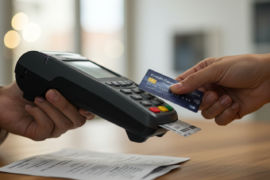This article may contain references to products or services from one or more of our advertisers or partners. We may receive compensation when you click on links to those products or services. Nonetheless, our opinions are our own.
The information presented in this article is accurate to the best of our knowledge at the time of publication. However, information is subject to change, and no guarantees are made about the continued accuracy or completeness of this content after its publication date.
Emerging digital payment possibilities are supplanting cash and card transactions in the UK, which has had a remarkable shift recently. Latest reports from UK finance stated that people using e-wallets have risen by 37% from 2020, which states that over 28 million people in the UK regularly use digital payment methods. This shift is not coincidental in any way. It happens due to a blend of technological advancement, innovative consumer behavior, and regulatory policies.
The Convenience Revolution
The UK has made tremendous shifts towards contactless and digital payments during the pandemic, which has dramatically escalated. During morning rush hours, people can just scan a QR code for coffee or tap their phones at the Underground station. It explains why people are leaning towards using digital wallets. Adoption rates of digital payments are highest among users who are busy professionals, always on the go, and value a great deal convenience.
No longer restricted to retail, the e-wallet boom has integrated transportation and utility payment systems. Old payment methods are incredibly clunky; remembering PIN numbers, physically carrying cards, and having to wait for chip readers all created extra friction, which has now been eliminated. This creates a new world where your finances can follow you everywhere as long as you have access to a digital wallet.
Security Innovations Driving Confidence
Declining security is a major concern that has slowed down e-wallet adoption rates, but modern solutions have almost entirely alleviated those issues. Digital wallets use modern biometric systems that authenticate users through fingerprints or facial recognition, which is much more difficult to forge than signatures and PINs.
The leading e-wallet providers use tokenization technology which means your personal financial information does not get sent during transactions. For each purchase, unique codes are created which make it nearly impossible for fraudsters to misuse, further reducing the value of the data being intercepted. The UK Cards Association reported that these new methods have also decreased digital payment fraud rates by 23% compared to other methods.
Voted "Best Overall Budgeting App" by Forbes and WSJ
Monarch Money helps you budget, track spending, set goals, and plan your financial future—all in one app.
Get 50% OFF your first year with code MONARCHVIP
Flexibility and Financial Freedom
Banking digitally is becoming more common due to the restrictive nature of conventional money lending institutions. For instance, e-wallets can complete transactions within minutes instead of days. This is beneficial for managing money as it gives an individual a greater say about when their money ought to move which can help with financial goals to be met.
Further, one’s credit score can benefit in a major way. Paying with an e-wallet method does not have the same effect and scrutiny on the score as credit card payments do. This, on its own, can help those controlling their debt navigate through a complex situation easily.
There are several customers, though, that view enhanced transaction monitoring positively. Unlike e-wallets, traditional banking systems have the habit of marking strange spending activities which can lead to accounts being frozen for a short period therefore leading to a prolonged verification process which is inconvenient. E-wallets providers, on the other hand, offer better control that protects the user.
Dealing With a Complex Regulatory Landscape
The versatility of e-wallets has revolutionized how Britons manage finances across numerous sectors. From retail and hospitality to subscription services and entertainment, digital payment methods have removed friction and increased access. This expansion has been particularly notable in the online leisure industry, where e-wallets offer speed and security that traditional banking can’t match.
The UK’s gambling sector provides an interesting case study in how digital payments interact with regulatory frameworks. A few years back, the United Kingdom Gambling Commission (UKGC) implemented GamStop, a self-exclusion scheme requiring all licensed operators to prevent registered users from accessing gambling services. While designed with consumer protection in mind, GamStop’s comprehensive approach has created unexpected challenges for casual users.
“The one-size-fits-all nature of GamStop means even responsible adults who occasionally enjoy online entertainment can find themselves completely locked out,” explains one of the consumer rights advocates. “This has created demand for more nuanced solutions.”
This situation has prompted many users to seek alternative payment methods. Some consumers look for PayPal to avoid GamStop restrictions while still enjoying entertainment options. The appeal is understandable—PayPal has become one of the most common payment methods in the British gambling market due to its top-notch security protocols, near-instantaneous transaction processing, and overall convenience. However, this creates a paradox for users, as PayPal primarily collaborates with UKGC-licensed online casinos, all of which employ the GamStop scheme.
This reality has created a delicate balance between consumer protection and personal autonomy. For users seeking flexibility, researching alternative e-wallet providers that offer similar security features to PayPal while providing different regulatory approaches has become increasingly common. These alternatives can process transactions with comparable speed and protection but operate under different jurisdictional frameworks.
The Future Outlook
The UK e-wallet market, in particular, seems ready to embrace further change. English UK continues looking into Central Bank Digital Currency (CBDC) which indicates a further penetration of digital payments into the economy’s infrastructure.
Experts believe that by the year 2026, e-wallets are likely to make up over sixty percent of all payments in the UK and this is likely to happen at the expense of other conventional forms of payment. This indicates a rather new phenomenon in payment transactions – the entire relationship that the British have with money is going to undergo an abrupt transformation.
In the meantime, it is wise to pay attention to emerging trends and look at the details of different e-wallets fills in the gap between safety and convenience in handling financial matters.

Reviewed and edited by Albert Fang.
See a typo or want to suggest an edit/revision to the content? Use the contact us form to provide feedback.
At FangWallet, we value editorial integrity and open collaboration in curating quality content for readers to enjoy. Much appreciated for the assist.
Did you like our article and find it insightful? We encourage sharing the article link with family and friends to benefit as well - better yet, sharing on social media. Thank you for the support! 🍉
Article Title: The UK’s Shift to E-Wallets: What’s Fueling the Surge in Digital Payments?
https://fangwallet.com/2025/04/10/the-uks-shift-to-e-wallets-whats-fueling-the-surge-in-digital-payments/The FangWallet Promise
FangWallet is an editorially independent resource - founded on breaking down challenging financial concepts for anyone to understand since 2014. While we adhere to editorial integrity, note that this post may contain references to products from our partners.
The FangWallet promise is always to have your best interest in mind and be transparent and honest about the financial picture.
Become an Insider

Subscribe to get a free daily budget planner printable to help get your money on track!
Make passive money the right way. No spam.
Editorial Disclaimer: The editorial content on this page is not provided by any of the companies mentioned. The opinions expressed here are the author's alone.
The content of this website is for informational purposes only and does not represent investment advice, or an offer or solicitation to buy or sell any security, investment, or product. Investors are encouraged to do their own due diligence, and, if necessary, consult professional advising before making any investment decisions. Investing involves a high degree of risk, and financial losses may occur including the potential loss of principal.
Source Citation References:
+ Inspo
There are no additional citations or references to note for this article at this time.












































